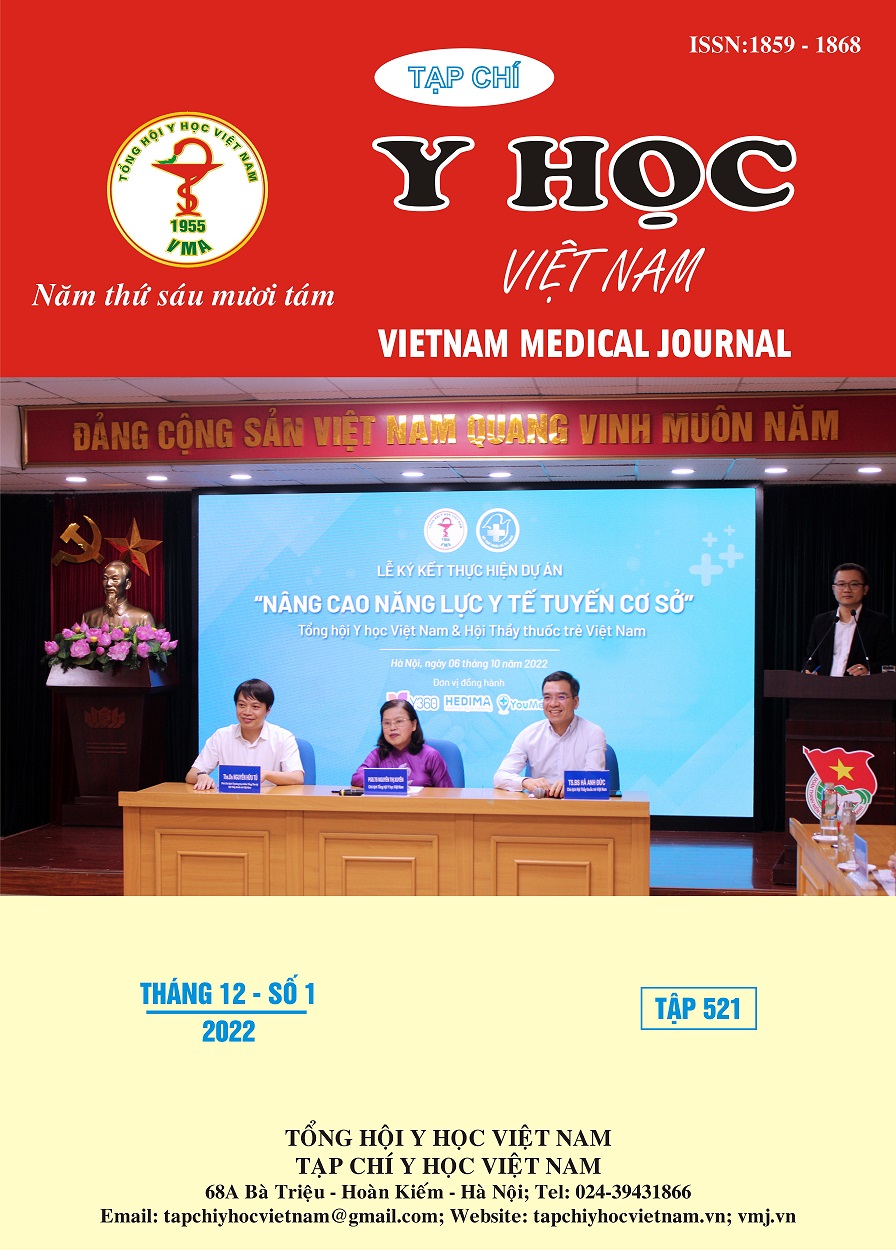RESULTS OF REPLACEMENT OF MITRAL VALVE AT HANOI MEDICAL UNIVERSITY HOSPITAL
Main Article Content
Abstract
Objective: Evaluate early results after mitral valve replacement surgery at Hanoi Medical University Hospital. Results: From 10/2019 to 05/2022, 43 patients with heart valve disease had gone through mitral valve replacement at the Cardiothoracic - Thoracic Operations Unit of Hanoi Medical University Hospital with heart valve disease and were eligible to participate in the study with the average age is 55.6 ± 10.7. Before surgerys, 34.9% of patients had a history of percutaneous balloon mitral valvuloplasty, 39.5% of patients had NYHA class III, IV, the cardiothoracic ratio 0.6 ± 0.07, average of EF 58.1 ± 8.5%, and pulmonary pulse pressure 48.2 ± 15.7 mmHg. In the surgerys, 74.4% of patients received mechanical valve replacement, 62.8% of patients received bilateral tricuspid repair, 46.5% of patients is sutured auricle of left atrium. CPB mean time 109.0 ± 20.7 minutes, and clamping the aorta 83.0 ± 21.8 minutes. After surgerys, the average time of the ventilator was 25.5 ± 20.8 hours, the average time in the ICU was 3.5 ± 1.3 days and an average time after surgery of 12.8 ± 6.2 days. 79,1% saw an improvement in their NYHA, and 1 patient (2.3%) had to drain the pleural cavity because of hemoptysis. 1 patient (2.3%) had to be hospitalized for anticoagulation adjustment, 1 patient (2.3%) had to undergo reoperation because of bleeding. There were no cases of death due to primary vascular disease. Conclusion: Mitral valve replacement surgery at Hanoi Medical University hospital is bringing positive results with a low rate of complications and mortality and safety.
Article Details
Keywords
Mitral valve replacement, prosthetic mitral valve
References
2. WHO Technical Report Series. Rheumatic fever and rheumatic heart disease: Report of a WHO expert panel. WHO. 2004;(Geneva 29.10-1.11.2001).
3. Lê Hoàng Văn. Kết quả bước đầu thay van sinh học tại BV 175. VJCTS. 5:12-16.
4. Đoàn Quốc Hưng. Kết quả phẫu thuật thay van hai lá do hẹp bằng van nhân tạo cơ học ATS tại Bệnh viện Trung ương Quân đội 108. Vietnam Med J. 2021.
5. Otto CM, Nishimura RA. 2020 ACC/AHA Guideline for the Management of Patients With Valvular Heart Disease. Journal of the American College of Cardiology. 2021;77(4).
6. Đinh Thị Tuyết Lan. Nghiên cứu kết quả nong van hai lá bằng bóng inoue ở bệnh nhân hẹp hai lá có rung nhĩ. Luận văn thạc sĩ. Đại học Y Hà Nội. 2008. 24-25
7. Arora R, Kalra GS, Singh S, et al. Percutaneous transvenous mitral commissurotomy: immediate and long-term follow-up results. Catheter Cardiovasc Interv Off J Soc Card Angiogr Interv. 2002;55(4):450-456.
8. Junjiro Kobayashi, MD KB MD. Early and late stroke after mitral valve replacement with a mechanical prosthesis: Risk factor analysis of a 24-year experience. J Thorac Cardiovasc Surg. 2003.


